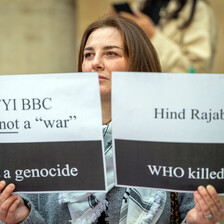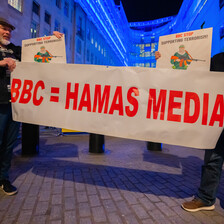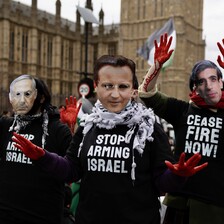The Electronic Intifada 25 November 2025

Complicit: Britain’s Role in the Destruction of Gaza by Peter Oborne, OR Books (2025)
Peter Oborne has written the most powerful, detailed summary so far of Britain’s complicity in the Israeli military’s onslaught on Gaza.
He shreds the British government’s futile efforts to pretend otherwise.
On the book’s final page he sums up the system that has enabled Britain’s rulers and media to suppress and misrepresent internal opposition to the Gaza genocide.
“The British public was against this horror from the start. Even as both major parties opposed a truce, with the media demonizing Palestinian solidarity protesters as bigots and thugs, a majority of citizens continued to support a Gaza ceasefire.”
Oborne emphasizes the “basic decency of the British public” but finds that ”the insulation of ruling bodies from public opinion left British citizens powerless to rescue the people of Gaza.”
This duplicity is echoed in the United States and other Western nations, most especially Germany and France, where governments, oppositions, academic institutions and the mainstream media have protected Israel and tried to punish or outlaw its opponents. But Oborne’s ruthless examination of the British involvement in the Gaza invasion and its major campaign at home to misrepresent its own role and shield Israel from the consequences of murderous actions is, I think, especially important.
The United Kingdom is the US’s closest ally and was the very creator and enabler 108 years ago of a Zionist Palestine.
Britain has remained since the Nakba of 1947-9 an ally and armorer of Israel. It continues to be so in this concerted Israeli attempt to kill or expel as many Palestinians as possible – if not all of them – from the Gaza Strip.
This book examines in detail Britain’s machinations to avoid condemning Israel or taking effective punitive action to stop the carnage.
British double-dealing
It takes on: Britain’s ignoring and downplaying the critical rulings of the International Court of Justice in January of 2024 and the later issuance of arrest warrants against the Israeli premier and defense minister by the International Criminal Court; Britain’s cooperation with the Israeli Gaza campaign via Royal Air Force spy flights over Gaza from the British base in Cyprus, and intelligence sharing; and the campaign in most of the mainstream media, including the BBC, to present Israel’s slaughterous missions as understandable reactions to Palestinian violence, persistently emphasizing and exaggerating what happened on 7 October 2023, while ignoring the decades of dispossession and violence Israel has delivered the Palestinian people.
It is a handbook of British double-dealing and international criminality expressed via support for Israel.
This is partly, Oborne finds, because of the UK’s maintaining a subservient relationship with its mighty American ally and boss; but also because the three main British parties, and to a large extent the mainstream media, are in the grip of the Israel lobby, which terrifies and manipulates politicians and journalists’ editors.
Here I think is an important subtext of Oborne’s book: his own story.
This is a vivid example of how it works in the mainstream media.
Oborne reports, correctly, that two of the most eminent historians of the Middle East, particularly of the origins of the creation of Israel and the expulsions and massacres of the Palestinians, are Avi Shlaim and Ilan Pappé. Each is Israeli, each lives in England, neither is ever on the BBC to put the story in proper perspective or at the very least challenge the dominant “Israel has the right to defend itself” mantra.
Media censorship
Experienced diplomats, historians and journalists who challenge the Israeli versions of history and current affairs do not on the whole make the media cut.
This is also true of Oborne himself, though he does not say so in this book.
Twenty years ago, Oborne, a conservative political writer of some eminence, was regularly on BBC programs as a presenter and guest, bearing the imprimaturs of the Tory Daily Telegraph and the right-wing weekly The Spectator, for both of which he was a columnist.
Then, some 15 years ago, he delved into the Israel-Palestine story, spent much time in Palestine and became a forceful writer and commentator on the issue. He was one of those very rare English journalistic voices spelling out the realities and challenging the Israeli version of its modern history, so readily repeated by those often ill-informed politicians and commentators who do make the cut.
But Oborne was no longer, and still is not, on the BBC.
As with so many aspects of this story, the history of Israeli aggression and ethnic cleansing, the illegality of the settlements, and now also the occupation itself, Britain’s long, repressive and fateful role in setting up Israel on Palestinian land and then sustaining it, all this is largely downplayed by the BBC. So is the order of the battle: who is attacking whom; who is occupying and killing and stealing property and land from whom.
I single out the BBC as it is nationally, and to a great extent internationally, trusted as an impartial news source and required by its Royal Charter to be impartial. In this it signally fails.
The BBC does not investigate the Cyprus RAF spy flights, for instance, or the increasingly arbitrary police crackdown on British journalists and activists who support the Palestinian cause – or, more correctly, oppose Israel’s policy of expelling as many Palestinians as possible from their homeland.
The underdog
As Oborne describes in detail, an editorial exclusion zone has descended on the massive British protest movement, except on occasion to try to misrepresent it or discredit it. Quite apart from the government’s attempts to criminalize pro-Palestinian protesters by representing them as violent thugs and anti-Semites or supporters of terrorism, the media has joined in this demonization by failing to report these mass rallies and epic marches at all.
When TV news does report them, it concentrates on fringe arrests that are more often than not provoked by right-wing groups who oppose the marches. Much is inevitably made, by the police and by politicians, of alleged anti-Semitism, or trying to smear pro-Palestinian marchers as “Hamas sympathizers.”
“Politicians and media portray the marchers as anti-British,” writes Oborne. “In truth they profoundly represent British values as these have been traditionally understood, belief in fairness, tolerance, the rule of law. Standing up for the underdog.”
As a British person myself I get this. I grew up inculcated with these beliefs, in a similar background to Oborne’s.
It was all about fair play: do unto others as you would be done by. True, it was a set of beliefs not always adhered to, and our political class often ignored them.
But never have I seen in my home country, elected governments and media accept such murderous evil in real time, right before their eyes and ears almost minute-by-minute on every TV, radio and online gadget.
Our political and media class have largely and deliberately divorced themselves from the values of the “man in the street,” whether young, old, male, female, white, brown or Black, immigrant or home-grown.
“Israel does have that right”
Memories are short.
Oborne reminds us that the British and the Americans (and Soviet Russia) created the United Nations in 1945, and with it the International Court of Justice. Britain chose immediately to ignore and demean this court’s January 2024 ruling that Israel had a plausible case to answer on the question of genocide, and did nothing to put pressure on Israel to abide by the court’s judgment that it should refrain from genocidal acts or genocidal incitement.
Oborne also reports evidence that the Conservative British government at the time of the ICJ ruling tried to put pressure on the prosecutor at the International Criminal Court not to issue arrest warrants for Benjamin Netanyahu, the Israeli prime minister, and Yoav Gallant, then its defense minister. This was never confirmed.
He also reminds us of Keir Starmer’s shocking reply to a LBC interviewer on 11 October 2023, who asked him about the then Israeli defense minister’s advocacy of cutting off water, fuel and power to Gaza (a war crime). Starmer (then leader of the opposition Labour Party) said: “I think that Israel does have that right [my italics]. It is an ongoing situation. Obviously everything should be done within international law, but I don’t want to step away from the core principles, that Israel has the right to defend herself and Hamas bears responsibility.”
Oborne recalls that Starmer appeared for Croatia at the ICJ in 2014 in the case alleging that Serbian forces had committed genocide against Croatians. The main points he made were, says Oborne, all applicable to Israel nine years later: Serbian expansionism; statements by public officials demonizing the victims; attacks going beyond legitimate military objectives; contemporary footage of genocidal attacks.
Starmer also argued that genocide is not a numbers game – it does not require the extermination of all or even a substantial part of a group.
These have all been arguments made on behalf of Israel by British politicians, including the former foreign secretary, David Lammy.
Ignoring the courts
These duplicitous maneuvers may temporarily get our political leaders off the hook, says Oborne, but there may be trouble ahead. Even if Britain regards itself as above the law and refuses to enforce, say, future war crimes arrest warrants issued against British politicians or military personnel, those same warrants may well be promulgated in jurisdictions that do recognize ICJ rulings or International Criminal Court warrants.
Oborne ends his book by damning everyone concerned in this British complicity, from the two prime ministers in office from 7 October 2023, first the Conservative Rishi Sunak, then Starmer, through the Foreign Office, the arms industry and the media, the archbishop of Canterbury and the BBC’s bosses.
Not one aspect of the UK establishment escapes his wrath.
But this is not just a polemic by an outraged Englishman who writes of an England betrayed at its moral heart. It is also a detailed, minutely notated and sourced, history of the two years’ carnage that have followed – still follow at the date of this writing – 7 October 2023.
Complicit is so up to date that there was no time for an index, which is a shame but probably inevitable.
It is a work writers and researchers will find invaluable. Perhaps a new edition at some seminal stage in the Gaza story can be produced.
It is also my guess, and I hope I am proved wrong, that no review of this book will appear in Britain’s mainstream media or be mentioned on the BBC, ITV or Sky.
Neither will its articulate, former BBC guest appear on the BBC’s airwaves.
That is the way it is these days: some truths are best left unapproached.
Tim Llewellyn is a former BBC Middle East correspondent and website editor of the Britain Palestine Project. The views here are his own.






Add new comment